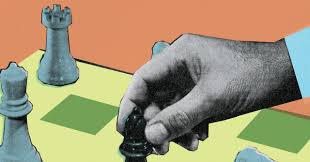
In history, the balance of power between a King and a Kingmaker as they pursue who holds more power depends entirely on the particular given scenario.
It does not always play out the same way everywhere.
In chess, one might assume the King holds all the cards. After all, a King sits upon the throne, issues decrees, and commands pawns, rooks, knights, and bishops to do their bidding.
Yet, look beyond the chessboard, and you’ll find a far clearer reality.
At the beginning of the game, the very person who helped elevate the King to their lofty position, by placing the King on the Chessboard throne zone, often wields considerable influence behind the scenes. O yes! The Playmaker can decide how, where, and when to move the chess pieces.
The Playmaker cum Kingmaker, having orchestrated the King’s ascension through painstakingly cultivated alliances and strategically deployed resources, tends to hold the upper hand.
They know the layout of the land, the key players, and the levers of power that truly matter.
Most of the time, an ambitious King portrays the rarity or naiveness of a newbie in power play.
They build up a perceived threat lurking within and will waste little time in shoring up their position, leveraging their newfound authority to build independent power bases and alliances of their own, positioning themselves to be a future playmaker cum kingmaker.
Of course, a truly experienced kingmaker anticipates this very move.
They’ve likely prepared contingency plans, hidden reserves of influence at different institutions that matter, and a base of loyal supporters.
The result is usually shocking and might ultimately result in different interpretations.
Yet, the other determinants of power in this high-stakes game often lie beyond the direct control of either party.
How do the common folk perceive the new King compared to their Predecessor cum Kingmaker? What lasting impact did the Kingmaker have during their time on the throne?
These factors, and many more, can sway public opinion and the loyalty of key institutions in unpredictable ways.
It’s tempting to think that popular public support would be the ultimate decider in such power struggles. However, in many societies throughout history, the will of the people has carried far less weight than we might assume.
When key institutions like the police, the military, the treasury, and the religious power-holders are firmly in the grasp of either the kingmaker or the king, public sentiment unavoidably becomes a secondary concern.
That’s not to say the voice of the people is entirely irrelevant.
There have been instances where widespread displeasure or sudden shifts in popular opinion have caught both King and Kingmaker off guard, shaking their resolve. While they focus on outmaneuvering each other, they may miss the wind of change brewing beyond their influences as evidenced in the 2023 general elections in Nigeria which saw Kingmakers and Kings lose out even with their high-level institutional influences to the choice of the masses because of the Peter Obi wave.
The struggle for supremacy between King and Kingmaker tends to be dynamic.
Today’s victors may find themselves on the executioner’s block tomorrow. Alliances crumble, new alliances emerge, and fortunes shift.
In this realm of high-stakes politics, the only non-constant between king and kingmaker is that he who has more to lose should read the room very well, before leaving its comfort and venturing into murky and crocodile-infested waters.

